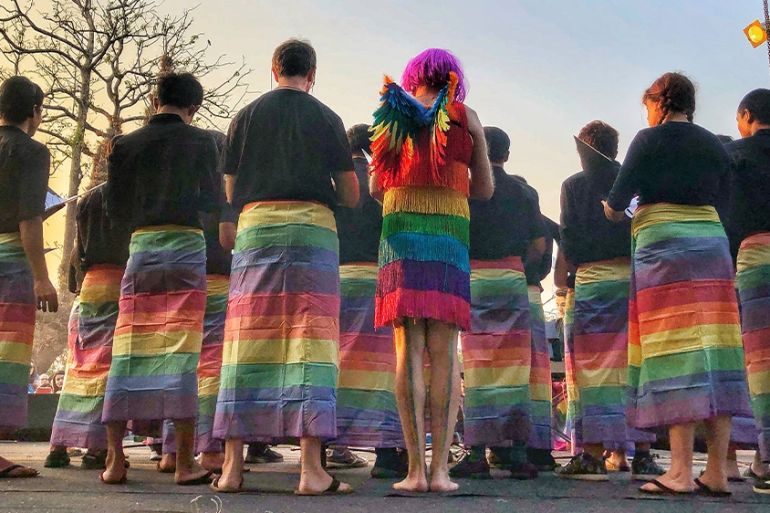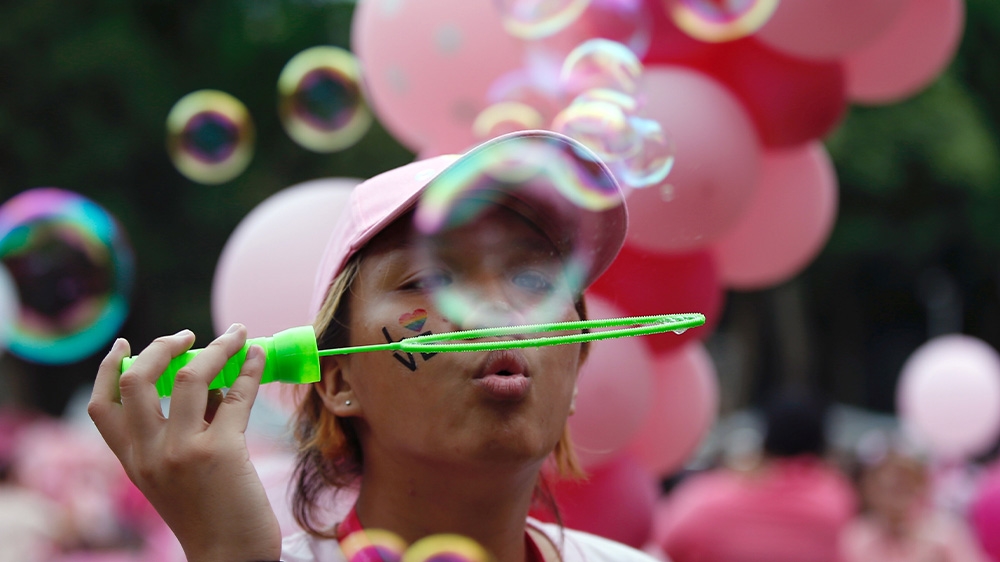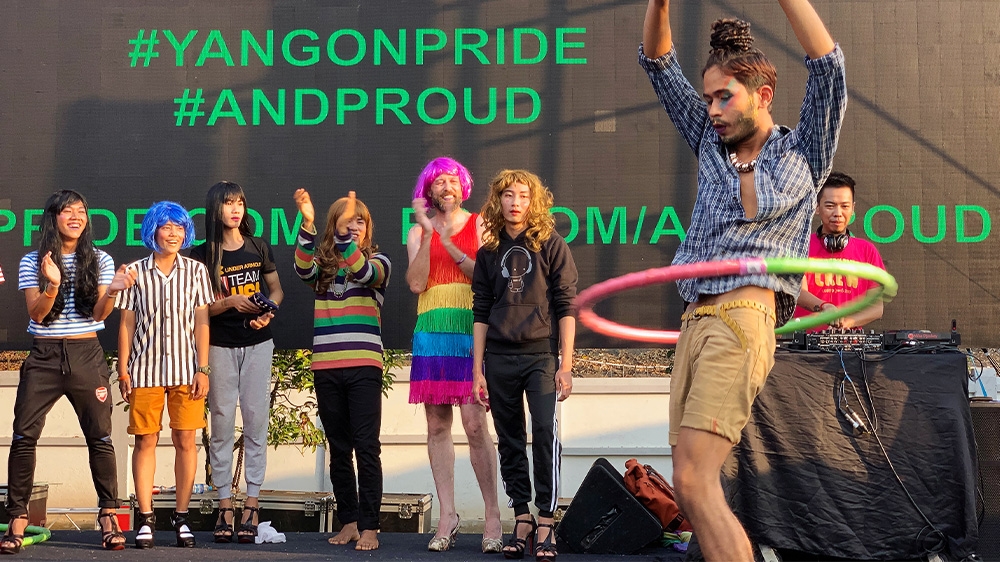Myanmar government urged to scrap colonial-era law on gay sex
Myanmar one of more than 40 countries where laws introduced by British entrench discrimination against LGBT people.

Yangon, Myanmar – Khin Maung Htun, a gay man in Myanmar, was standing on the street one night last year scrolling through his phone when police showed up to arrest some men who had been fighting nearby.
The brawl had nothing to do with him; he had not even realised it was going on. But one of the police officers happened to know some acquaintances of his and recognised his face.
Keep reading
list of 3 itemsCharges in Mongolia LGBT attack hint at changing attitudes
Gay fathers get less paid parental leave than other couples
“He is gay,” the officer told his colleagues as he pointed at Khin Maung Htun, “so arrest him too.”
At the police station, he was made to kneel down with the other men as police kicked them. Then he was singled out by an officer who demanded to know why he was gay, before slapping him.
The other men were allowed to call their families to bail them out, but police told him he would have to wait much longer to do so because of his sexual orientation.
Khin Maung Htun was among dozens of LGBT people who gave accounts of widespread abuse and violence at the hands of Myanmar’s authorities for a new report.
The Denmark-funded report – In the Shadows – calls on the country’s first democratically-elected government in decades to scrap Section 377, which punishes gay sex with up to 10 years in prison.
Colonial relic
The law remains on the books in more than 40 countries across the world a remnant of the British empire, but a global movement to undo the colonial legacy is gaining momentum.
Several countries, including India, Botswana, Trinidad & Tobago and Belize, have overturned Section 377 or similar anti-gay legislation in recent years, boosting hopes that activists can achieve the same in other countries that were once British colonies.

Singapore’s High Court on Wednesday began hearing a series of legal challenges to its anti-gay law from activists emboldened by last year’s ruling in India. It follows a failed attempt to overturn the law in 2014.
A victory there would also galvanise campaigners in Malaysia, where Section 377 carries a 20-year jail sentence and the gay sex is also prohibited under Islamic laws. While the law is not always enforced, last week the religious court sentenced five men to jail and caning for attempting to have gay sex.
Anwar Ibrahim, who is expected to be Malaysia’s next prime minister, told Al Jazeera’s UpFront programme last year that the anti-sodomy law needed amending because it could be wielded against people “without any proper evidence”.
Anwar himself has been imprisoned twice on sodomy charges that he said were politically motivated. However, his ruling coalition has yet to make any attempt at decriminalisation.
Months after winning a May 2018 election, Prime Minister Mahathir Mohamad said LGBT rights were “things we cannot accept”.
“Some things are only meant for the West,” he added.
Not a priority
Myanmar’s leader, former human rights icon Aung San Suu Kyi, spoke out in support of decriminalising same-sex relations while in opposition in 2013. But she has failed to use the parliamentary supermajority she won in a 2015 election to make that a reality.
“I think it’s just not on her list of priorities,” said Michelle Yesudas, a human rights lawyer and one of the researchers behind In the Shadows. “But at the same time, there’s no reason to stop reminding her.”

Myo Nyunt, a spokesperson for Aung San Suu Kyi‘s National League for Democracy, said the party had “no intention” of overturning Section 377 and had to be “very careful” in the run-up to next year’s election.
“The opposition might use it to attack us,” he told Al Jazeera. “They have formerly accused the NLD of being a non-religious party and of giving special favours to groups who want … freedoms just like the Western societies.”
Joseph O’Mahoney, a lecturer in Politics and International Relations at the University of Reading, finds it ironic that politicians suggest tolerance of LGBT people is a Western invention.
More than half of all countries that outlaw homosexuality had those laws imposed by British colonial rulers, he and his colleague Enze Han found in 2014.
“The trope that tolerance is neo-colonialism or Western bullying is common in the media and public discourse in many countries,” O’Mahoney told Al Jazeera.
|
|
Despite that, “the global trend toward decriminalisation is rapid in historical terms and we are not seeing much recriminalisation”, he added, “so I am very optimistic in the medium-term at least”.
‘Shadow Laws’
In Myanmar, a host of other laws besides section 377 are used to persecute LGBT people.
Transgender women have been arrested for wearing makeup after police deemed it was a “disguise” under a set of statutes known as the “Shadow Laws”.
The laws also date from the colonial era and give police sweeping powers to arrest anyone out after dark or who they deem to be suspicious.
One transwoman told researchers for In the Shadows, she was arrested under these laws for carrying a pair of scissors. Like many transgender people, one of the few forms of work open to her is as a hair and makeup stylist.
Police in Myanmar routinely rape, beat and verbally abuse transwomen and others with impunity while using the threat of prosecution to extract bribes, the report found.
In other cases, judges refused to hear from witnesses because they were from the LGBTQ community and court staff were openly homophobic and transphobic, the report added.
A spokesperson for Myanmar’s police force did not answer calls from Al Jazeera seeking comment.
O’Mahoney says he is unsure exactly what role the United Kingdom should play in redressing the damage it has done to LGBT communities worldwide.
“One policy that I think definitely is both under Britain’s control and also morally urgent is granting asylum to LGBT people who face danger in their home countries both due to laws imposed by the British as well as other laws,” he said.